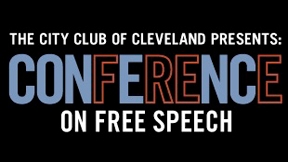

Archive
Broadcast
About



A SERVICE OF OHIO'S PUBLIC BROADCASTING STATIONS
A SERVICE OF OHIO'S PUBLIC BROADCASTING STATIONS
Program Directory

City Club of Cleveland Presents: Conference on Free Speech - Free Speech in the Political Arena
Money talks differently than ever before. Citizens United and landmark campaign finance decisions have reoriented the balance of power among political speakers, but so too have communications technologies and the internet which give immediate public platforms to unprecedented numbers of commentators. Changes in the media industry affect the public conversation: the accelerating pace of the 24-hour news cycle has created pressures on the depth and substance of political commentary, and shifts among the major networks and online platforms fragment audiences into what some commentators call interest communities and others call echo chambers.
Participation in the political conversation has changed as well. We speak in unprecedented ways and on an unprecedented scale, but with the instant transmission of thought to text, or speech to broadcast, has come what many would characterize as an erosion of civility. As social media blurs lines between personal and public communication, we know more than we want to, perhaps, or say more than we need to. With the pressure on media entities and individual pundits to assemble the biggest audience and capture the public's attention come serious concerns about the depth and tone of public discussion.
This panel assembles elected officials and leading commentators in law and politics to discuss the future of political speech, including:
* How has the balance of power shifted among political speakers? Among commentators?
* Does the new media environment's guarantee that somewhere, somehow, someone is watching and recording chill political speech? Does improved government tranparency similarly chill free speech?
* To what extent does an explosion in new speech come at the expense of sound civic deliberation and civil public discourse? Does the public taste for scandal displace public conversation of serious issues?
* What authorities can we trust for accurate discussion of public affairs?
* Does the immediacy of modern coverage inevitably oversimplify issues? How does political deliberation respond to the depth of coverage? Has politics become more or less responsive to the electorate?
* With unfiltered individuals replacing institutional publishers as speakers, can false, abusive, or slanderous speech in the political arena ever meaningfully be deterred?
October 10, 2011


